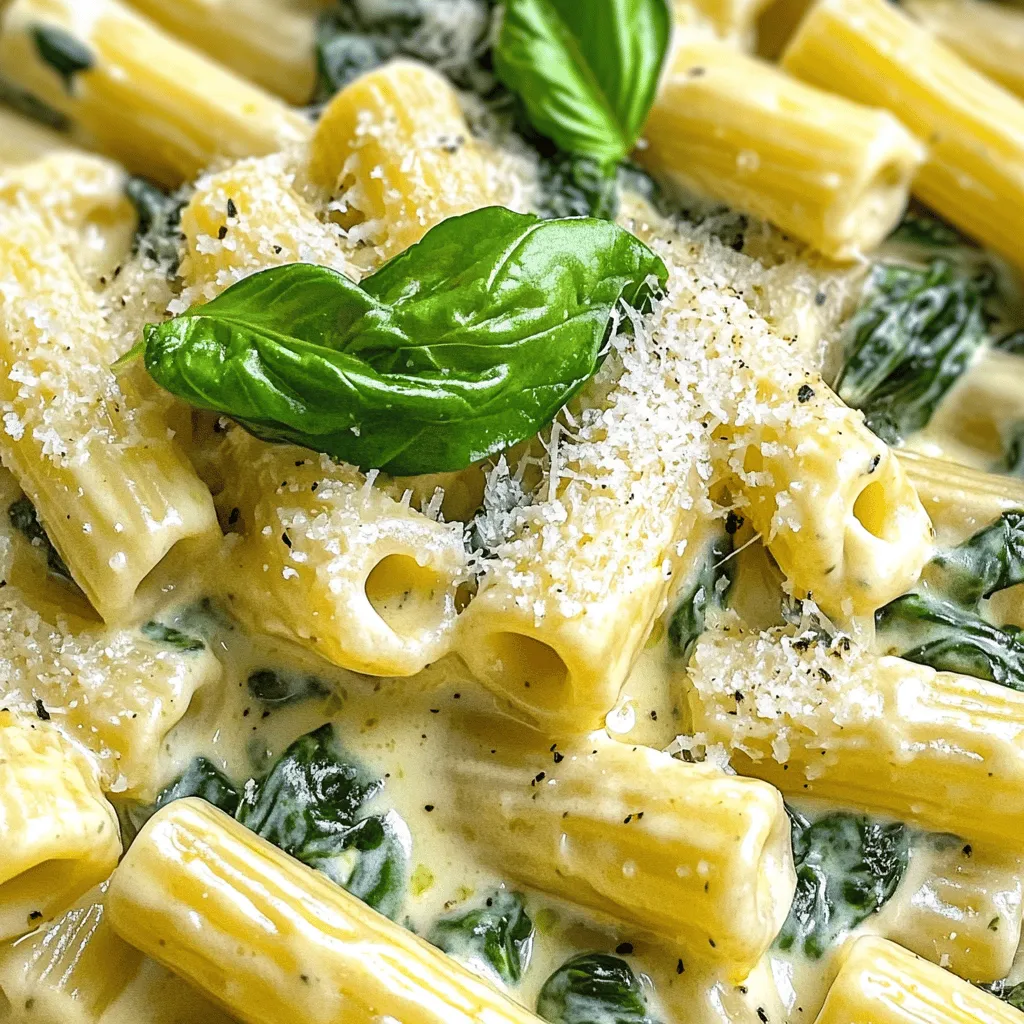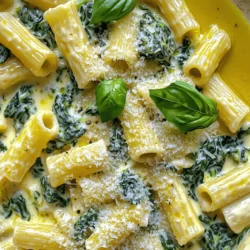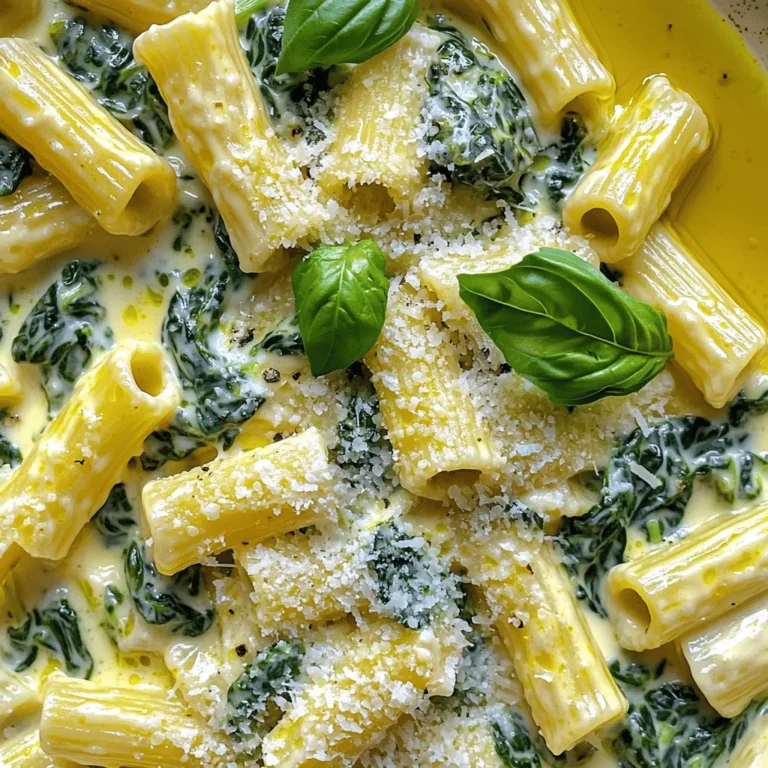If you’re craving a quick and delicious meal, I’ve got you covered. My Creamy Spinach Ricotta Pasta is a delightful dinner that you can whip up in no time. This recipe combines fresh spinach and creamy ricotta for a taste explosion. Plus, it’s flexible with many ingredient choices. Ready to impress your family or friends? Let’s dive into the details and get cooking!
Ingredients
List of Essential Ingredients
To make creamy spinach ricotta pasta, you need some key items. Here’s what you will need:
– 250g pasta of your choice (penne or fettuccine work well)
– 200g fresh spinach, roughly chopped
– 250g ricotta cheese
– 1 tablespoon olive oil
– 2 cloves garlic, minced
– 1/2 teaspoon nutmeg
– Salt and pepper to taste
– 50g grated Parmesan cheese
– 1/2 cup heavy cream or plant-based alternative
– Fresh basil leaves for garnish
These ingredients come together to create a rich and tasty dish. Each one adds to the creamy texture and flavor.
Optional Ingredients for Added Flavor
You might want to spice things up a bit. Here are some optional ingredients to consider:
– Red pepper flakes for heat
– Lemon zest for freshness
– Sun-dried tomatoes for a tangy bite
– Mushrooms for an earthy taste
Adding these items can enhance the dish’s flavor, making it even more enjoyable.
Recommended Pasta Varieties
While you can use any pasta, some types work best. I recommend:
– Penne: Holds sauce well
– Fettuccine: Adds a nice ribbon effect
– Farfalle: Looks pretty on the plate
Choose the pasta that you enjoy or have on hand. Each type will bring its own charm to the meal.
Step-by-Step Instructions
Detailed Cooking Process
To make creamy spinach ricotta pasta, start with the pasta. Bring a large pot of salted water to a boil. Add 250g of your favorite pasta. Cook it until al dente, following the package directions. Once done, reserve 1/2 cup of pasta water. Then, drain the pasta and set it aside.
Next, it’s time for the spinach. In a large skillet, heat 1 tablespoon of olive oil over medium heat. Once the oil is hot, add 2 cloves of minced garlic. Sauté for about 30 seconds until it smells great. Then, add 200g of roughly chopped fresh spinach. Cook until it wilts, which takes about 3 to 4 minutes.
Now, let’s make the sauce. Lower the heat and stir in 250g of ricotta cheese. Add 1/2 teaspoon of nutmeg and 1/2 cup of heavy cream. Mix everything until it’s smooth and creamy.
Finally, combine the pasta and sauce. Add the cooked pasta to the skillet. Gradually add the reserved pasta water until it reaches your desired creaminess. Mix gently to combine.
Tips for Cooking Pasta to Perfection
To cook pasta perfectly, always use plenty of water. Use about 4 to 6 quarts for every pound of pasta. This keeps the pasta from sticking. Add salt to the water. It should taste like the ocean. This helps flavor the pasta as it cooks. Remember to stir the pasta occasionally while it cooks. This prevents clumping and ensures even cooking.
Making the Spinach and Ricotta Sauce
Making the spinach and ricotta sauce is simple. Start with a hot skillet and oil. Sauté garlic first to enhance the flavor. Then add the spinach. Cook it just until it wilts; overcooking can make it mushy. When adding ricotta, mix it well with the cream. This keeps the sauce smooth. If the sauce feels too thick, add a little of the reserved pasta water. This will help it blend perfectly with the pasta.
Tips & Tricks
Enhancing Creaminess with Pasta Water
To make your sauce extra creamy, save some pasta water. After cooking the pasta, reserve 1/2 cup of the starchy water. This water can help your sauce stick to the pasta better. Start by adding a little at a time while mixing. This way, you control the creaminess level. The starch in the water helps bind everything. The result? A silky sauce that clings to every noodle.
Flavor Boosters for the Sauce
Want to kick up the flavor? Here are some great ideas. You can add a pinch of red pepper flakes for heat. A squeeze of lemon juice brightens the dish. Fresh herbs, like parsley or thyme, can also add freshness. If you like a cheesy flavor, mix in more Parmesan. Each of these options can change the taste in a fun way. Experiment and find what you love best!
Substitutions for Dietary Preferences
Need to make some swaps? No problem! If you’re dairy-free, use a plant-based ricotta. Cashew or almond-based options work well. For a lighter dish, swap heavy cream for a mix of almond milk and cornstarch. If you’re gluten-free, choose gluten-free pasta. The key is to keep the flavors and textures enjoyable, no matter your diet.

Variations
Vegetarian Variations
You can easily make this dish more vibrant. Add more vegetables like bell peppers, zucchini, or mushrooms. These veggies will bring fresh colors and flavors to your creamy spinach ricotta pasta. You can also use different herbs, like thyme or parsley, for added taste. If you want some crunch, consider adding toasted pine nuts or walnuts. They add a nice texture and a nutty flavor.
Protein Additions (Chicken, Shrimp, etc.)
If you want to boost the protein, try adding chicken or shrimp. For chicken, cook bite-sized pieces in the skillet before adding the spinach. Cook until golden brown and fully cooked. For shrimp, toss them in just before the spinach wilts. They cook quickly, and their sweetness works well with the creamy sauce. Both options make this dish heartier and more filling.
Gluten-Free Options
To make this pasta dish gluten-free, swap regular pasta for gluten-free pasta. There are many great options made from rice, quinoa, or chickpeas. Just be sure to check the cooking time on the package. You can also make a zucchini noodle version called zoodles. Use a spiralizer to create long, thin noodles from zucchini. They will soak up the sauce nicely and keep the dish light.
Storage Info
How to Store Leftovers
To keep your creamy spinach ricotta pasta fresh, let it cool first. Then, place it in an airtight container. This helps keep the flavors strong. Store it in the fridge for up to three days. If you want to enjoy it later, freezing is a great option.
Reheating Tips for Best Results
When you are ready to eat the leftovers, use the stovetop for reheating. Place the pasta in a skillet over low heat. Add a splash of water or cream to keep it creamy. Stir gently until it’s warm. This method helps keep the pasta from drying out. You can also use the microwave, but add a little liquid to help.
Freezing Guidelines for Future Meals
Freezing creamy spinach ricotta pasta is easy. Place it in a freezer-safe container. Make sure to leave some space at the top for expansion. It can last up to three months in the freezer. When you want to use it, thaw it in the fridge overnight. Then, reheat as mentioned before. Enjoy a quick meal any time!
FAQs
Can I use frozen spinach instead of fresh?
Yes, you can use frozen spinach. Just thaw and drain it well. Frozen spinach cooks faster than fresh, so adjust the cooking time. This swap saves time and still adds great flavor.
What can I substitute for ricotta cheese?
If you need a substitute for ricotta, try cottage cheese or cream cheese. Both options give a similar creamy texture. You can also use soft tofu for a dairy-free alternative. Blend it for a smooth result.
How can I make this dish vegan-friendly?
To make this dish vegan, use plant-based ricotta or blended tofu. Replace heavy cream with coconut cream or a plant-based milk. Don’t forget to use nutritional yeast for a cheesy flavor. This keeps it tasty while meeting vegan needs.
This blog post explored the key ingredients and steps for a tasty pasta dish. We discussed essential and optional ingredients, various cooking tips, and ways to enhance flavor. You learned how to adapt recipes for different diets and successfully store any leftovers. Remember, cooking is fun! Mix ingredients and try new tricks. Enjoy your meals with family and friends, making every bite special. Happy cooking!


